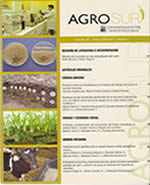Effect of a turmeric-based fertilizer on tomato production at green-house level
Main Article Content
Abstract
Inorganic fertilizers have impacts on the availability of nutrients and the content of organic matter in the soil, as well as on its native microbiota. A turmeric fertilizer (TF) with added food residues and wood ashes was developed to evaluate its effects on tomato production and crop soil properties. The TF was prepared by emulsion technology using three turmeric concentrations expressed as 1.0, 2.5 and 3.0 % w/v; it was characterized according to its rheological (apparent viscosity, consistency and flow behavior indexes) and physical (z-average droplet size) characteristics. Nitrogen, phosphorus and potassium (NPK) levels and moisture-holding capacity were measured in crop soil. Colour, soluble solid content, acidity, diameter and the number of tomatoes were evaluated. The photosynthetic index of the leaves of tomato plants was determined. It was observed that when turmeric concentration increased (> 1.0 % w/v), the droplet size decreased enhancing the physical stability of TF. NPK levels and moisture-holding capacity of the soil improved, especially with turmeric concentrations > 1.0% w/v. Positive effects on the tomato fruit properties (soluble solid content, acidity, diameter and tomato number) and photosynthetic index of tomato plant leaves were observed with turmeric concentrations of 2.5 and 3.0 % w/v. The TF positively influenced the crop soil and the metabolic process of the tomato plants, and the characteristics of its fruits.

